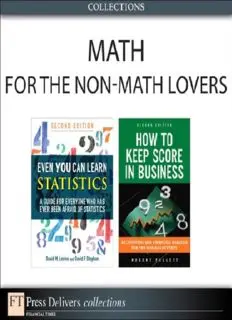Table Of ContentAbout This eBook
ePUB is an open, industry-standard format for
eBooks. However, support of ePUB and its many
features varies across reading devices and applications.
Use your device or app settings to customize the
presentation to your liking. Settings that you can
customize often include font, font size, single or
double column, landscape or portrait mode, and figures
that you can click or tap to enlarge. For additional
information about the settings and features on your
reading device or app, visit the device manufacturer’s
Web site.
Many titles include programming code or
configuration examples. To optimize the presentation
of these elements, view the eBook in single-column,
landscape mode and adjust the font size to the smallest
setting. In addition to presenting code and
configurations in the reflowable text format, we have
included images of the code that mimic the
presentation found in the print book; therefore, where
the reflowable format may compromise the
presentation of the code listing, you will see a “Click
here to view code image” link. Click the link to view
the print-fidelity code image. To return to the previous
page viewed, click the Back button on your device or
app.
Math for the Non-Math
Lovers (Collection)
David M. Levine
David F. Stephan
Robert Follett
Vice President, Publisher: Tim Moore Associate
Publisher and Director of Marketing: Amy Neidlinger
© 2013 by Pearson Education, Inc.
Publishing as FTPress Delivers
Upper Saddle River, New Jersey 07458
Company and product names mentioned herein are the
trademarks or registered trademarks of their respective
owners.
All rights reserved. No part of this book may be
reproduced, in any form or by any means, without
permission in writing from the publisher.
ISBN-10: 0-13-359719-9
ISBN-13: 978-0-13-359719-6
For more information, please contact us at
[email protected]
Even You Can Learn Statistics: A Guide
for Everyone Who Has Ever Been Afraid
of Statistics, Second Edition
Acknowledgments
About the Authors
Introduction. The Even You Can Learn Statistics Owners
Manual
Chapter 1. Fundamentals of Statistics
1.1. The First Three Words of Statistics
1.2. The Fourth and Fifth Words
1.3. The Branches of Statistics
1.4. Sources of Data
1.5. Sampling Concepts
1.6. Sample Selection Methods
Chapter 2. Presenting Data in Charts and Tables
2.1. Presenting Categorical Variables
2.2. Presenting Numerical Variables
2.3. Misusing Charts
Chapter 3. Descriptive Statistics
3.1. Measures of Central Tendency
3.2. Measures of Position
3.3. Measures of Variation
3.4. Shape of Distributions
Chapter 4. Probability
4.1. Events
4.2. More Definitions
4.3. Some Rules of Probability
4.4. Assigning Probabilities
Chapter 5. Probability Distributions
5.1. Probability Distributions for Discrete Variables
5.2. The Binomial and Poisson Probability Distributions
5.3. Continuous Probability Distributions and the Normal
Distribution
5.4. The Normal Probability Plot
Chapter 6. Sampling Distributions and Confidence
Intervals
6.1. Sampling Distributions
6.2. Sampling Error and Confidence Intervals
6.3. Confidence Interval Estimate for the Mean Using the
t Distribution (σ Unknown)
6.4. Confidence Interval Estimation for Categorical
Variables
Chapter 7. Fundamentals of Hypothesis Testing
7.1. The Null and Alternative Hypotheses
7.2. Hypothesis Testing Issues
7.3. Decision-Making Risks
7.4. Performing Hypothesis Testing
7.5. Types of Hypothesis Tests
Chapter 8. Hypothesis Testing: Z and t Tests
8.1. Testing for the Difference Between Two Proportions
8.2. Testing for the Difference Between the Means of
Two Independent Groups
8.3. The Paired t Test
Chapter 9. Hypothesis Testing: Chi-Square Tests and
the One-Way Analysis of Variance (ANOVA)
9.1. Chi-Square Test for Two-Way Cross-Classification
Tables
9.2. One-Way Analysis of Variance (ANOVA): Testing
for the Differences Among the Means of More Than Two
Groups
Chapter 10. Simple Linear Regression
10.1. Basics of Regression Analysis
10.2. Determining the Simple Linear Regression
Equation
10.3. Measures of Variation
10.4. Regression Assumptions
10.5. Residual Analysis
10.6. Inferences About the Slope
10.7. Common Mistakes Using Regression Analysis
Chapter 11. Multiple Regression
11.1. The Multiple Regression Model
11.2. Coefficient of Multiple Determination
11.3. The Overall F test
11.4. Residual Analysis for the Multiple Regression
Model
11.5. Inferences Concerning the Population Regression
Coefficients
Chapter 12. Quality and Six Sigma Applications of
Statistics
12.1. Total Quality Management
12.2. Six Sigma
12.3. Control Charts
12.4. The p Chart
12.5. The Parable of the Red Bead Experiment:
Understanding Process Variability
12.6. Variables Control Charts for the Mean and Range
Appendix A. Calculator and Spreadsheet Operation and
Configuration
A.C1. Calculator Operation Conventions
A.C2. Calculator Technical Configuration
A.C3. Using the A2MULREG Program
A.C4. Using TI Connect
A.S1. Spreadsheet Operation Conventions
A.S2. Spreadsheet Technical Configurations
Appendix B. Review of Arithmetic and Algebra
Assessment Quiz
Symbols
Answers to Quiz
Appendix C. Statistical Tables
Appendix D. Spreadsheet Tips
CT: Chart Tips
FT: Function Tips
ATT: Analysis ToolPak Tips (Microsoft Excel only)
Appendix E. Advanced Techniques
E.1. Using PivotTables to Create Two-Way Cross-
Classification Tables
E.2. Using the FREQUENCY Function to Create
Frequency Distributions
E.3. Calculating Quartiles
E.4. Using the LINEST Function to Calculate Regression
Results
Appendix F. Documentation for Downloadable Files
F.1. Downloadable Data Files
F.2. Downloadable Spreadsheet Solution Files
Glossary
Index
How to Keep Score in Business:
Accounting and Financial Analysis for the
Non-Accountant
Chapter 1 Introduction
The First Lesson: Scores Are Not Real Dollars
The Accrual Method
But Scores Are Important
Chapter 2 Glossary of Key Financial Accounting Terms
Glossary

